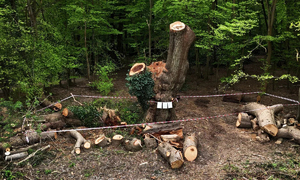In the name of saving humanity from a climate emergency and offering seemingly irresistible handouts of money and technology, the colonists insist on replacing fossil fuels with unreliable and expensive wind and solar energy.
Yet the relatively high mortality and morbidity of Africans ― among the world’s poorest people ― can be relieved only by the energy of demonized coal, oil and natural gas.
This artificially induced energy gap is the difference between life and death, hope and despair. It’s a pernicious intrusion in energy markets that shortens life spans, snuffs out newborns’ cries and erects barriers to progress.
In 2024, it is unconscionable that over 600 million Africans still lack access to electricity. In sub-Saharan Africa, only 28% of health care centers have reliable electricity.
More than 900 million people cook with traditional biomass such as wood and animal dung, inhaling toxic fumes that claim over 600,000 African lives each year. Clean water remains a luxury for vast swaths of the population.
As has been shown in parts of Asia, these problems can be alleviated over time with robust investment in fossil fuels. Coal and natural gas can provide affordable and reliable electricity, and natural gas can immediately reduce deaths from the pollution of dirty cooking fuels.
Consider that a single electric car charging overnight in Europe consumes as much power as an entire African village uses in a week. Such stark disparities are not mere numbers. They represent battle lines in the daily struggle for survival of Africa’s impoverished.
Nations find themselves ensnared in a global madness and their potential extinguished like fire without oxygen.
에너지 이용이 아프리카 발전의 초석이다 (1)
비제이 자야라지(환경과학자)
기후 비상사태로부터 인류를 구원한다는 명분을 내세우고 겉보기로 거부할 수 없는 지원금 및 기술을 제안함으로써 식민주의자들은 화석연료를 신뢰할 수 없고 값이 비싼 풍력 및 태양력 에너지로 교체하자고 고집한다.
그러나 세계의 가장 가난한 주민들에 포함되는 아프리카 사람들의 상대적으로 높은 사망률과 질병률은 오직 악마화된 석탄과 석유 및 천연가스의 에너지에 의해서만 완화될 수 있다.
인위적으로 유도된 이 에너지 격차는 생과 사, 희망과 절망 사이의 차이다. 그것은 수명을 단축시키고 신생아들의 울음소리를 완전히 끝장내고 발전을 막는 장애물을 세우는, 에너지 시장에 대한 치명적인 침해다.
2024년에 6억명의 아프리카 사람들이 여전히 전기를 이용하지 못한다는 사실은 터무니없는 일이다. 사하라 이남 아프리카에서는 진료센터의 불과 28%만이 신뢰할 수 있는 전기를 이용한다.
9억명 이상이 나무와 동물의 고형 배설물 같은 전통적인 생물연료로 취사를 하고 60만명 이상의 아프리카인들이 유독한 연기를 들이마시고 매년 사망한다. 광범한 비율의 인구에게 아직도 깨끗한 물은 사치다.
아시아의 몇몇 부분에서 본 바와 같이 이런 문제들은 화석연료에 대한 강력한 투자로 시간이 지나면 완화될 수 있다. 석탄과 천연가스는 구하기 쉽고 신뢰할 수 있는 전기를 공급할 수 있고 천연가스는 불결한 취사 연료의 오염으로 발생하는 사망자 수를 즉각적으로 줄일 수 있다.
유럽에서 하룻밤 동안 1대의 전기차를 충전하는 데 소비되는 전력이 아프리카 마을 하나가 일주일 동안 사용하는 전기량과 맞먹는 사실을 고려해 보자. 그런 엄연한 불균형은 단순한 숫자가 아니다. 그런 불균형은 아프리카 빈민들의 일상적인 생존투쟁의 전투선을 의미한다.
아프리카 국가들은 세계적인 광기의 덫에 걸려들어 그들의 잠재력은 산소 없는 불처럼 꺼졌다.
오성환 외신전문위원 suhwo@segye.com
[ⓒ 세계일보 & Segye.com, 무단전재 및 재배포 금지]
![[설왕설래] 조선통신사선(船)](http://img.segye.com/content/image/2025/04/24/128/20250424524776.jpg
)
![[기자가만난세상] 시골 어르신들, 왜 쓰레기를 태울까](http://img.segye.com/content/image/2021/06/18/128/20210618512915.jpg
)
![[삶과문화] 5분이면 족한 것들](http://img.segye.com/content/image/2025/02/13/128/20250213519369.jpg
)









